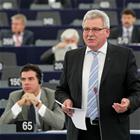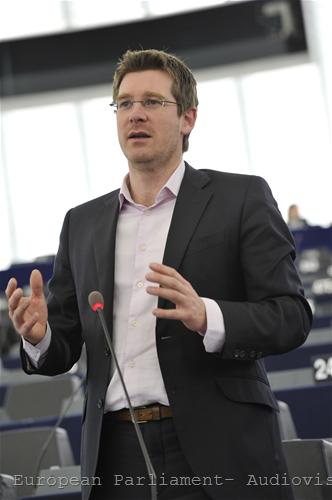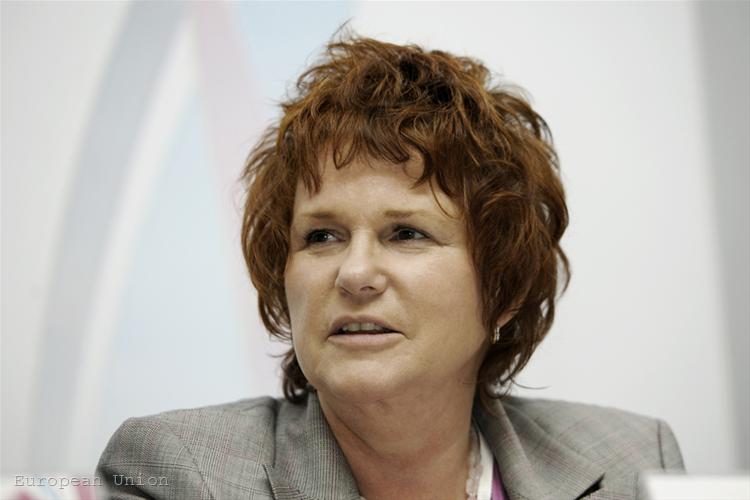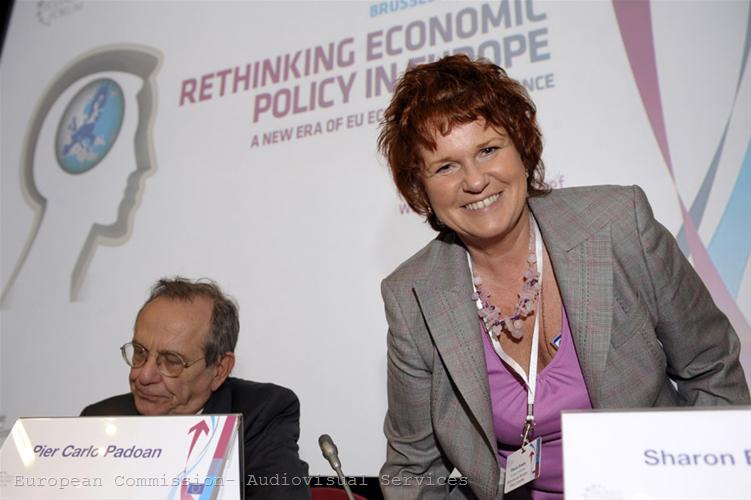The EP and the Council argue again over the financial regulation
Ralitsa Kovacheva, Evelina Topalova, July 7, 2011
 The European Parliament has adopted its position on OTC derivatives, short selling and investor compensations, while expecting lengthy disputes with the Council (the member states) over the three subjects.
The European Parliament has adopted its position on OTC derivatives, short selling and investor compensations, while expecting lengthy disputes with the Council (the member states) over the three subjects.
With regard to the short selling and derivatives, the final vote was postponed in order to reach an agreement with the Council during the negotiations. Furthermore, some of the proposals must be concurred with EU's partners in the G20, the Chair of EP's Economic Committee, Sharon Bowles, said after the vote: “We held off taking the final vote so that we can consider giving a more timely outcome that fits in with the G20 agenda, rather than going to the process of a second reading. So we leave that window of opportunity open and we are hoping the Council will be able to avail themselves of it”.
the Chair of EP's Economic Committee, Sharon Bowles, said after the vote: “We held off taking the final vote so that we can consider giving a more timely outcome that fits in with the G20 agenda, rather than going to the process of a second reading. So we leave that window of opportunity open and we are hoping the Council will be able to avail themselves of it”.
 The parliamentary rapporteur on the OTC derivatives, Werner Langen (EPP, Germany), explained that “despite the efforts of the Hungarian Presidency, the Council has not yet achieved an overall political agreement on this sector,” and there were still significant differences between Parliament and the Council. They are related mainly to the scope of the new rules, as the Council wants all derivatives to be included in the clearing, even those traded on stock exchanges, while the Parliament considers that there should be some exemptions. The issue is getting more complicated given the request made by the American Congress EU to exclude of this regulation the small and the savings banks, although the US government does not have a majority for this proposal, Mr Lange explained. In this sense, there is also the issue of recognition of clearing houses from third countries - particularly with the US we insist on reciprocity, the rapporteur said.
The parliamentary rapporteur on the OTC derivatives, Werner Langen (EPP, Germany), explained that “despite the efforts of the Hungarian Presidency, the Council has not yet achieved an overall political agreement on this sector,” and there were still significant differences between Parliament and the Council. They are related mainly to the scope of the new rules, as the Council wants all derivatives to be included in the clearing, even those traded on stock exchanges, while the Parliament considers that there should be some exemptions. The issue is getting more complicated given the request made by the American Congress EU to exclude of this regulation the small and the savings banks, although the US government does not have a majority for this proposal, Mr Lange explained. In this sense, there is also the issue of recognition of clearing houses from third countries - particularly with the US we insist on reciprocity, the rapporteur said.
Another controversial point is how to treat pension funds. The role of the European Securities and Markets Authority (ESMA) is also a subject of controversy between Parliament and Council. "The national authorities should keep their responsibilities, but they should be strengthened by having a single interpretation of the rules for all,” Werner Langen noted. He expressed hope that in October, at the latest, there would be an agreement between Parliament and Council so the legislation to be finally adopted.
The Parliament also endorsed the report of Pascal Kanfin (Greens, EFA) on  naked short selling and credit default swaps (CDS). The text requires traders to settle their uncovered short positions by the end of each trading day. It restricts purchases of CDS contracts to owners of related government bonds, in order to reduce speculation with government debt, as the rapporteur explained: “The Greek situation shows us how urgent and necessary legislation in this field is. Traders dealing in Greek CDS are throwing oil in the fire, with their only goal being that of making money”.
naked short selling and credit default swaps (CDS). The text requires traders to settle their uncovered short positions by the end of each trading day. It restricts purchases of CDS contracts to owners of related government bonds, in order to reduce speculation with government debt, as the rapporteur explained: “The Greek situation shows us how urgent and necessary legislation in this field is. Traders dealing in Greek CDS are throwing oil in the fire, with their only goal being that of making money”.
As for the compensation schemes legislation, the Parliament closed the first reading procedure because of expected significant differences between the position of the EP and that of the Council, which is yet to be adopted. The text, approved by the Parliament, includes a faster capitalisation of compensation schemes and the opportunity for private investors to claim compensation in case of “bad advice” by investment firms.
 The Parliament wants more EU-level harmonisation for the design of the schemes and imposes larger financial contributions on investment firms taking the biggest risks. “I believe in the free market and the right to choose. But there must also be the right to protection. The ordinary man-in-the-street investor needs to know he is protected,” Parliamentary rapporteur Olle Schmidt (ALDE, Sweden) commented.
The Parliament wants more EU-level harmonisation for the design of the schemes and imposes larger financial contributions on investment firms taking the biggest risks. “I believe in the free market and the right to choose. But there must also be the right to protection. The ordinary man-in-the-street investor needs to know he is protected,” Parliamentary rapporteur Olle Schmidt (ALDE, Sweden) commented.
 | © European Parliament- Audiovisual Unit
| © European Parliament- Audiovisual Unit | © European Union
| © European Union | © European Commission- Audiovisual Service
| © European Commission- Audiovisual Service | © European Union
| © European Union | © REGIERUNGonline/Bergmann
| © REGIERUNGonline/Bergmann | © European Union
| © European Union | © European Parliament
| © European Parliament | © The Council of the European Union
| © The Council of the European Union | © European Parliament
| © European Parliament